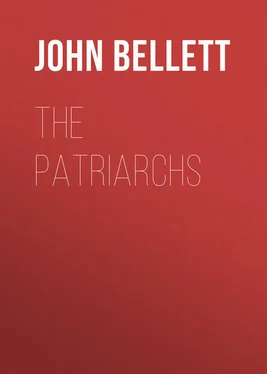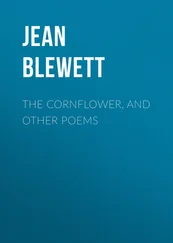John Bellett - The Patriarchs
Здесь есть возможность читать онлайн «John Bellett - The Patriarchs» — ознакомительный отрывок электронной книги совершенно бесплатно, а после прочтения отрывка купить полную версию. В некоторых случаях можно слушать аудио, скачать через торрент в формате fb2 и присутствует краткое содержание. Жанр: foreign_antique, foreign_prose, Биографии и Мемуары, на английском языке. Описание произведения, (предисловие) а так же отзывы посетителей доступны на портале библиотеки ЛибКат.
- Название:The Patriarchs
- Автор:
- Жанр:
- Год:неизвестен
- ISBN:нет данных
- Рейтинг книги:4 / 5. Голосов: 1
-
Избранное:Добавить в избранное
- Отзывы:
-
Ваша оценка:
- 80
- 1
- 2
- 3
- 4
- 5
The Patriarchs: краткое содержание, описание и аннотация
Предлагаем к чтению аннотацию, описание, краткое содержание или предисловие (зависит от того, что написал сам автор книги «The Patriarchs»). Если вы не нашли необходимую информацию о книге — напишите в комментариях, мы постараемся отыскать её.
The Patriarchs — читать онлайн ознакомительный отрывок
Ниже представлен текст книги, разбитый по страницам. Система сохранения места последней прочитанной страницы, позволяет с удобством читать онлайн бесплатно книгу «The Patriarchs», без необходимости каждый раз заново искать на чём Вы остановились. Поставьте закладку, и сможете в любой момент перейти на страницу, на которой закончили чтение.
Интервал:
Закладка:
"And Noah builded an altar unto the Lord; and took of every clean beast, and every clean fowl, and offered burnt offerings on the altar. And the Lord smelled a sweet savour: and the Lord said in His heart, I will not again curse the ground any more for man's sake; for the imagination of man's heart is evil from his youth: neither will I again smite any more every thing living, as I have done. While the earth remaineth, seed time and harvest, and cold and heat, and summer and winter, and day and night, shall not cease." The cleansing of the waters of judgment had made no change in the imaginations of the thoughts of man's heart. They were still evil, and that only. The heart was uncured, for "that which is born of the flesh is flesh," though there be water to cleanse or fire to refine. It was no change there which gave the Lord thoughts of peace and not of evil towards men.
"Faith eyes the blood of Christ, and not victory over corruptions," as one has said, even where there is such victory. But here, in spite of corruptions , that blood awakens thoughts of peace and not of evil, to give the sinner an expected end. Christ was under the eye of God, and that was enough; as in the day of atonement. The blood of sprinkling is then seen everywhere. That was the great secret, the great principle, of that mystic day in Israel. The blood of the lamb (Lev. xvi.) went into the presence of God, attended by a cloud of incense; so that Aaron himself was hid, and there was no man in the tabernacle of the congregation, as the holy service of putting the blood on every thing proceeded. Christ in mystery was seen, and nothing else-and the fruit of that was the bearing away of sins into the wilderness, a land not inhabited, a place of forgetfulness, where there was no voice to accuse, to judge, or to condemn, where nothing could be heard but the voice of that blood which speaketh better things than the blood of Abel.
That blood, now under the eye of the Lord God, had moved His heart. Do I speak as a man? No, the word is, "The Lord said in His heart, I will not again curse the ground." As the Saviour Himself says (in spirit bound for the altar), "Therefore doth my Father love me, because I lay down my life." The heart of the Lord God has sealed the acceptance of the sacrifice. It did so here, in the times of Noah.
This word that broke from the heart of the Lord God in Noah's day, the passage of the burning lamp in Abraham's day (Gen. xv.), and the answer of God to Solomon (2 Chron. i.), all witness to the value of the cross of Christ with God established. The rending of the veil from top to bottom, the breaking of the rocks, and the bursting of the graves, witness the same, when the true offering was once and for ever accomplished. In rich variety of form and character is the acceptance of the work done in "the place that is called Calvary" testified and published-in every tongue and language, as it were, in Hebrew, and Greek, and Latin.
And Noah becomes at once the object of fresh and multiplied blessings, blessings in glory and inheritance now, as already he had blessings in election, an acceptance of grace and the righteousness which is by faith. "God blessed Noah and his sons, and said unto them, Be fruitful, and multiply, and replenish the earth. And the fear of you, and the dread of you, shall be upon every beast of the earth, and upon every fowl of the air, upon all that moveth upon the earth, and upon all the fishes of the sea: into your hand they are delivered."
Noah was blessed in the new world. That blessing conveyed to him property and dominion in the earth, and the use or enjoyment of the creatures good for food. "Every moving thing that liveth" was given to him, that it might be meat for him.
Here was a large grant, as wide as the scene which lay around him. He was monarch of all he surveyed, lord, like Adam in the garden, of the new world. Instructed, however, as well as honoured and enriched-taught that the blood of the animal was not to be eaten with its flesh : "the flesh with the blood thereof, which is the life thereof, thou shalt not eat" – a principle which involves all the thoughts and counsels of God in His way with sinners-as suited a prohibition, or limitation to the grant made to Noah now, as had been the prohibition of the tree in the midst of the garden, to the grant of all things else made to Adam.
The blood was the life, and man was not to eat it. It would have been a bold re-assuming of that which through sin he had lost, a challenge to regain life by forcing the passage kept by the sword of the cherubim. For this ordinance told the sinner, that having lost his title to the tree of life, he can never return to it in his own strength. The life has reverted to God. Blood is His. And the gospel comes to tell us how He has used it, even providing with it and through it new, eternal, infallible life for the dead sinner.
The way of God in the gospel was, therefore, rehearsed to Noah in this ordinance: "The flesh with the blood thereof, which is the life thereof, thou shalt not eat." His altar had already told us that he stood with Adam in the faith of the woman's Seed, and that that mystery was the principle of his religion and his worship. But here, while making over every thing to him for property, dominion, and use, the Lord will not pass by this great exception out of the grant; conveying, as it does, the great secret or principle of His gospel. In the changed circumstances of Adam and Noah, in the difference between an upright creature and a ruined sinner, this exception was as fitting and necessary, as I have said, as that of the tree of knowledge out of the grant of all with which the Lord, the Creator, had of old, furnished and filled the scene.
We take life from Christ who has made atonement by His blood. But we deeply own we can get it nowhere else. We do not look for it elsewhere, but we refuse it not from Him. We know we were dead in trespasses and sins, but we know that we have life in Him, though only in Him. Adam learnt these things in the promise of the woman's Seed, and in the sword of the cherubim; Noah learnt them or witnessed them in his altar and in this ordinance; these things the whole book of God declares; and eternity will celebrate them.
Further, however, still-for in this blessing we find Noah with the sword of justice in his hand. His fellow-man was to be both protected and avenged. Man's person was sacred; and his life or blood, if shed by either man or beast, would be required. "And surely your blood of your lives will I require; at the hand of every beast will I require it, and at the hand of man; at the hand of every man's brother, will I require the life of man. Whoso sheddeth man's blood, by man shall his blood be shed." 6 6 It has been justly said by another, that the principle of government was represented in Noah; that Adam had been the representative head of creation , and that Noah is the same now of government . And I doubt not, that after the judicial scattering from Babel, the nations became associations in which God still recognized the sword of justice and the seat of government, which therefore are still to be exercised, and ought still to be religiously owned and reverenced.
Who does not instinctively approve of this? All that we feel judges the fitness of thus treating the person of man as sacred. While every other moving thing that lived was submitted to the use of man, his fellow-man was to be sacred in his eyes.
We instinctively approve this. But this scripture accounts for this instinct. The reason lies here-"in the image of God made He man." There is a dignity in man that is entirely his own. He is the natural head of creation. Man is the possessor and governor, and not part of the conveyed inheritance, or of the delegated dominion. He is the object and not the subject of the divine grant. The instinctive verdict of our own hearts is thus divinely accounted for.
Читать дальшеИнтервал:
Закладка:
Похожие книги на «The Patriarchs»
Представляем Вашему вниманию похожие книги на «The Patriarchs» списком для выбора. Мы отобрали схожую по названию и смыслу литературу в надежде предоставить читателям больше вариантов отыскать новые, интересные, ещё непрочитанные произведения.
Обсуждение, отзывы о книге «The Patriarchs» и просто собственные мнения читателей. Оставьте ваши комментарии, напишите, что Вы думаете о произведении, его смысле или главных героях. Укажите что конкретно понравилось, а что нет, и почему Вы так считаете.












